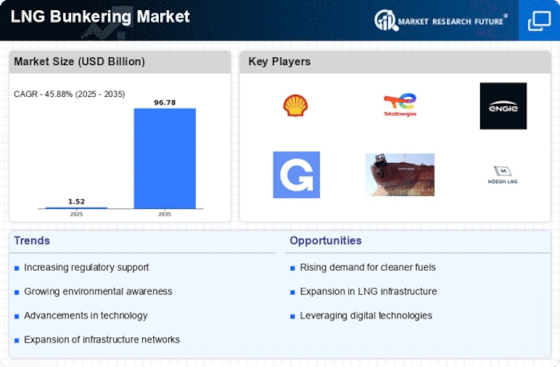Top Industry Leaders in the LNG Bunkering Market

*Disclaimer: List of key companies in no particular order
Top listed companies in the LNG Bunkering industry are:
Royal Dutch Shell plc.
Engie
Bomin Linde LNG GmbH & Co. KG
Gasum Ltd.
Gasnor AS
Korea Gas Corporation
Harvey Gulf International Marine LLC
Polskie LNG S.A.
Eagle LNG
ENN Energy Holdings Limited
EVOL LNG
Fjord Line
Crowley Maritime Corporation
SHV Energy
Gazpromneft Marine Bunker LLC
Navigating the LNG Bunkering Tide: Exploring the Competitive Landscape of a Booming Market
Beneath the churning oceans, a silent revolution simmers – the LNG bunkering market. This multi-billion dollar ecosystem pulsates with activity, as established giants, agile innovators, and regional specialists vie for a share in fueling maritime progress with liquefied natural gas (LNG). Let's delve into the key strategies, dynamics, and future trends shaping this dynamic space.
Key Player Strategies:
Global Titans: Companies like Shell, Gazprom, and ExxonMobil leverage their extensive experience, diverse infrastructure, and global reach to maintain their dominance. They cater to major shipping lines and port operators, offering comprehensive LNG bunkering solutions, including production, transportation, and bunkering infrastructure in strategic locations. Shell's LNG bunkering projects across Europe and Asia exemplify their focus on global expansion and integrated solutions.
Technology Disruptors: Startups like ENERGiE Bunker and Clean Marine Energy Corporation are disrupting the market with next-generation technologies like LNG bunkering vessels, truck-to-ship bunkering systems, and automated fueling processes. They cater to niche segments and environmentally conscious customers, offering efficient, flexible, and low-emission bunkering solutions. ENERGiE Bunker's mobile LNG bunkering vessels demonstrate their focus on innovative infrastructure and remote accessibility.
Cost-Effective Challengers: Chinese manufacturers like CIMC Enric and Wison Offshore & Marine are making waves with competitively priced LNG bunkering terminals and equipment, targeting cost-conscious buyers in emerging markets. They focus on affordability and basic functionality, offering alternatives to premium brands. Wison Offshore & Marine's LNG bunkering barges showcase their focus on cost-competitive solutions for regional port expansions.
Niche Specialists: Companies like Titan LNG and Skangas excel in specific segments like small-scale LNG bunkering for coastal vessels, LNG fuelling solutions for inland waterways, and specialized bunkering equipment. They leverage deep understanding of niche requirements and offer tailored solutions for diverse vessel types and operating environments. Titan LNG's bunkering services for inland waterways in Europe demonstrate their focus on specialized logistical solutions.
Factors for Market Share Analysis:
Infrastructure Availability and Accessibility: Developing LNG bunkering terminals and distribution networks in strategic ports, offering flexible bunkering options (ship-to-ship, truck-to-ship), and ensuring reliable LNG supply chains are crucial. Companies with strong infrastructure development and diverse access points gain an edge.
Cost and Affordability: Balancing advanced technologies with competitive pricing, offering financing options, and minimizing operational costs cater to diverse budget constraints and project feasibility. Companies providing cost-effective and flexible solutions gain market share.
Environmental Efficiency and Emissions Reduction: Offering LNG bunkering solutions that significantly reduce air emissions compared to conventional fuels, complying with evolving environmental regulations, and minimizing methane slip during bunkering operations are crucial. Companies with cleaner and more sustainable solutions gain an edge.
Technological Innovation and Operational Efficiency: Utilizing automated bunkering systems, digitalized logistics platforms, and data-driven optimization tools improves operational efficiency, minimizes downtime, and reduces human error. Companies leading in technological innovation attract tech-savvy operators and premium pricing.
New and Emerging Trends:
Focus on Green LNG and Renewable Energy Integration: Sourcing LNG from renewable sources like biogas or integrating LNG bunkering with wind or solar power generation creates sustainable and carbon-neutral bunkering solutions. Companies leading in green LNG initiatives attract environmentally conscious customers and regulatory benefits.
Digitalization and Data-Driven Optimization: Implementing real-time tracking and monitoring systems for LNG bunkering operations, optimizing supply chains with AI-powered solutions, and offering data-driven analytics to ship operators improve efficiency and minimize environmental impact. Companies leading in digitalization create new service offerings and enhance customer value propositions.
Focus on Decentralized and Mobile Bunkering: Developing compact and mobile LNG bunkering units, utilizing trucks or barges for flexible bunkering in remote locations, and catering to smaller vessels expand market reach beyond major ports. Companies offering decentralized solutions create new market segments and address accessibility challenges.
Collaboration and Partnerships: Building partnerships with shipping lines, port authorities, and infrastructure developers can facilitate faster market development, share expertise and resources, and overcome regulatory hurdles. Companies engaging in collaborative efforts gain an edge in complex project execution and market expansion.
Overall Competitive Scenario:
The LNG bunkering market is a dynamic and complex space with diverse players employing varied strategies. Established giants leverage their reach and infrastructure, while technology disruptors introduce innovative solutions. Cost-effective challengers cater to budget-conscious buyers, and niche specialists excel in specific applications. Factors like infrastructure development, cost-effectiveness, environmental impact, and technological innovation play a crucial role in market share analysis. New trends like green LNG, digitalization, decentralized bunkering, and collaboration offer exciting growth opportunities. To succeed in this evolving market, players must prioritize sustainable practices, embrace technological advancements, explore flexible solutions, and foster collaborative partnerships.
Latest Company Updates:
Bomin Linde LNG GmbH & Co. KG:
- December 12, 2023: Bomin Linde partners with TITAN LNG to expand LNG bunkering services in the Mediterranean (Bomin Linde press release).
Gasnor AS:
- November 17, 2023: Gasnor signs agreement with Engie for LNG bunkering supply in northern Europe (Gasnor press release).
ENN Energy Holdings Limited:
- August 8, 2023: ENN Energy acquires Singapore LNG bunkering company FueLNG (ENN Energy press release).
Fjord Line:
- November 16, 2023: Fjord Line orders two new LNG-powered ferries from Vard Marine (Fjord Line press release).










